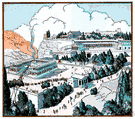Pergamum
Also found in: Thesaurus, Encyclopedia, Wikipedia.
Related to Pergamum: Thyatira
Per·ga·mum
(pûr′gə-məm) An ancient Greek city and kingdom of western Asia Minor in modern-day western Turkey. It passed to Rome in the second century bc and was noted for its sculpture and its library, which Mark Antony gave to Cleopatra.
American Heritage® Dictionary of the English Language, Fifth Edition. Copyright © 2016 by Houghton Mifflin Harcourt Publishing Company. Published by Houghton Mifflin Harcourt Publishing Company. All rights reserved.
Pergamum
(ˈpɜːɡəməm)n
(Placename) an ancient city in NW Asia Minor, in Mysia: capital of a major Hellenistic monarchy of the same name that later became a Roman province
Collins English Dictionary – Complete and Unabridged, 12th Edition 2014 © HarperCollins Publishers 1991, 1994, 1998, 2000, 2003, 2006, 2007, 2009, 2011, 2014
Per•ga•mum
(ˈpɜr gə məm)n.
1. an ancient Greek kingdom on the coast of Asia Minor: later a Roman province.
2. the ancient capital of this kingdom: now the site of Bergama, in W Turkey.
Random House Kernerman Webster's College Dictionary, © 2010 K Dictionaries Ltd. Copyright 2005, 1997, 1991 by Random House, Inc. All rights reserved.
ThesaurusAntonymsRelated WordsSynonymsLegend:
Switch to new thesaurus
| Noun | 1. |  Pergamum - an ancient Greek city located in the western part of what is now modern Turkey; the technique of preparing sheepskins as parchment was developed here Pergamum - an ancient Greek city located in the western part of what is now modern Turkey; the technique of preparing sheepskins as parchment was developed hereRepublic of Turkey, Turkey - a Eurasian republic in Asia Minor and the Balkans; on the collapse of the Ottoman Empire in 1918, the Young Turks, led by Kemal Ataturk, established a republic in 1923 |
Based on WordNet 3.0, Farlex clipart collection. © 2003-2012 Princeton University, Farlex Inc.